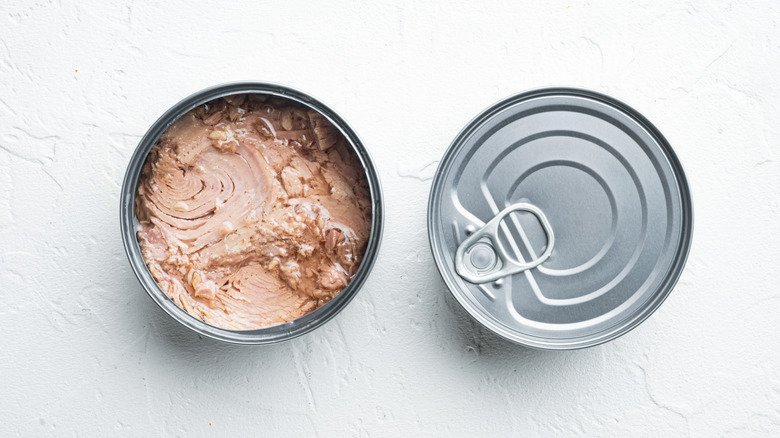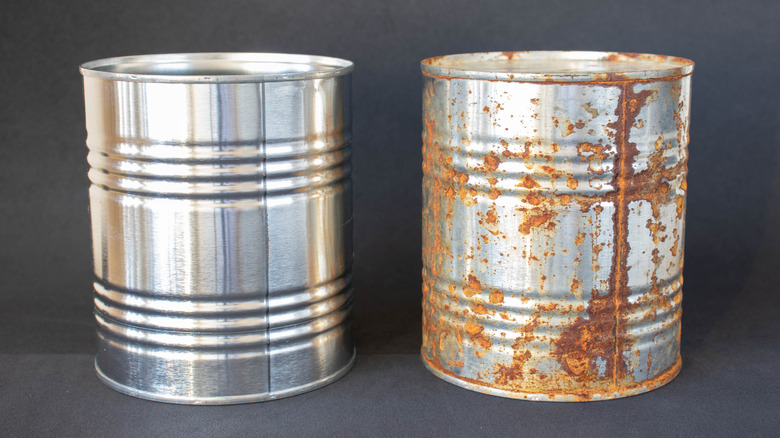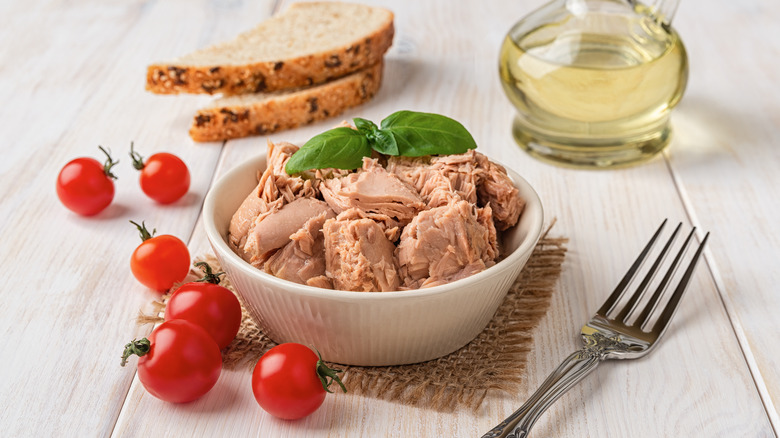The Worst Place In Your Kitchen To Store Canned Tuna
When most home cooks think about canned tuna, they think of indestructible, shelf-stable morsels that last for ages. This isn't entirely incorrect, as the U.S. Department of Agriculture states that a can of tuna can last up to a whopping five years if stored properly. The keywords, however, are "stored properly." You might believe that your tinned fish are tough enough to withstand just about anything, but there are areas of your kitchen that can spell disaster for canned tuna. In fact, leaving cans to sit on the counter by your stovetop might be one of the sneakiest and most detrimental food storage mistakes you can make.
Canned foods are more delicate than they seem, especially when it comes to temperature. Exposure to heat can accelerate the decomposition and quality loss of your tinned tuna, even when the cans are sealed shut. Specifically, temperatures above 100 degrees Fahrenheit are too much for this product to handle. And any cook knows that a hot oven or stovetop warms up the surrounding air, sometimes to sweltering conditions (like when you decide to bake a pie in the middle of summer).
It might seem convenient to keep your canned tuna close to the area where you whip up your go-to tuna salad or tuna casserole, but there are far better places to store it. "Cool, dark, and dry" is a common refrain in rules for storing canned goods, and your kitchen counter likely has none of these traits.
Moisture is another reason to keep canned tuna off the counter
Hot temperatures aren't the only hazard of storing your canned tuna out on the counter. Exposure to stray puddles of water from the kitchen sink — or even droplets of moisture that get tossed around while you're cooking — can also damage the cans. Most canned foods are stored in steel containers that can withstand any jostling that happens during transportation. The metal is resilient to physical damage and seals in the freshness of the food, but just a little water can compromise it.
Water exposure can be harmful to both the exterior and the interior of your tinned tuna, and keeping cans off the kitchen counter protects them from both temperature changes and exposure to moisture. If you get your counter wet after washing some lettuce, and unknowingly leave your canned tuna to sit in a puddle, it will develop rust (or corrosion, if the cans are aluminum). This decay eats away at the metal, forming tiny holes and perforations that allow bacteria and other pathogens to enter your preserved fish.
If you examine rusted cans of food closely, and determine with certainty that the marks are superficial and have not compromised the can or your food, the USDA recommends scrubbing off the residue with a paper towel. And while it likely won't send you to the emergency room, no one wants to eat rust, so keep tuna far away from sinks or other sources of water.
Where to store canned tuna, and more factors to watch out for
While the availability of cool, dark, and dry storage spaces depends on your home, a pantry or cabinet is usually the best place to store canned tuna. If your kitchen tends to get warm or humid, put the cans in your basement or cellar, instead. Ensuring that a storage space has these three golden traits is what's most important — but sometimes, canned goods still develop safety issues, even when stored properly.
Dents or other visible marks can quickly make canned tuna unsafe to eat. While you can safely look past a shallow dimple in a can, any large creases, gashes, or breaks can indicate that germs have infiltrated the inside, not to mention the tuna itself will degrade when exposed to air. Leaking and swelling are even more obvious examples of spoilage in canned tuna. Throw out any damaged cans you find in your pantry, and don't purchase discounted canned food with major signs of wear.
Once you've opened your canned tuna, any leftovers should go straight into an airtight container in the fridge. You don't want to leave the fish in the can, as its opened top can lead to spills, mold, and bacterial infection. Once popped open, the steel tin can also leach its flavor into the tuna. You should also never eat canned tuna that was accidentally frozen, as it will not only taste bad, but could make you sick.



